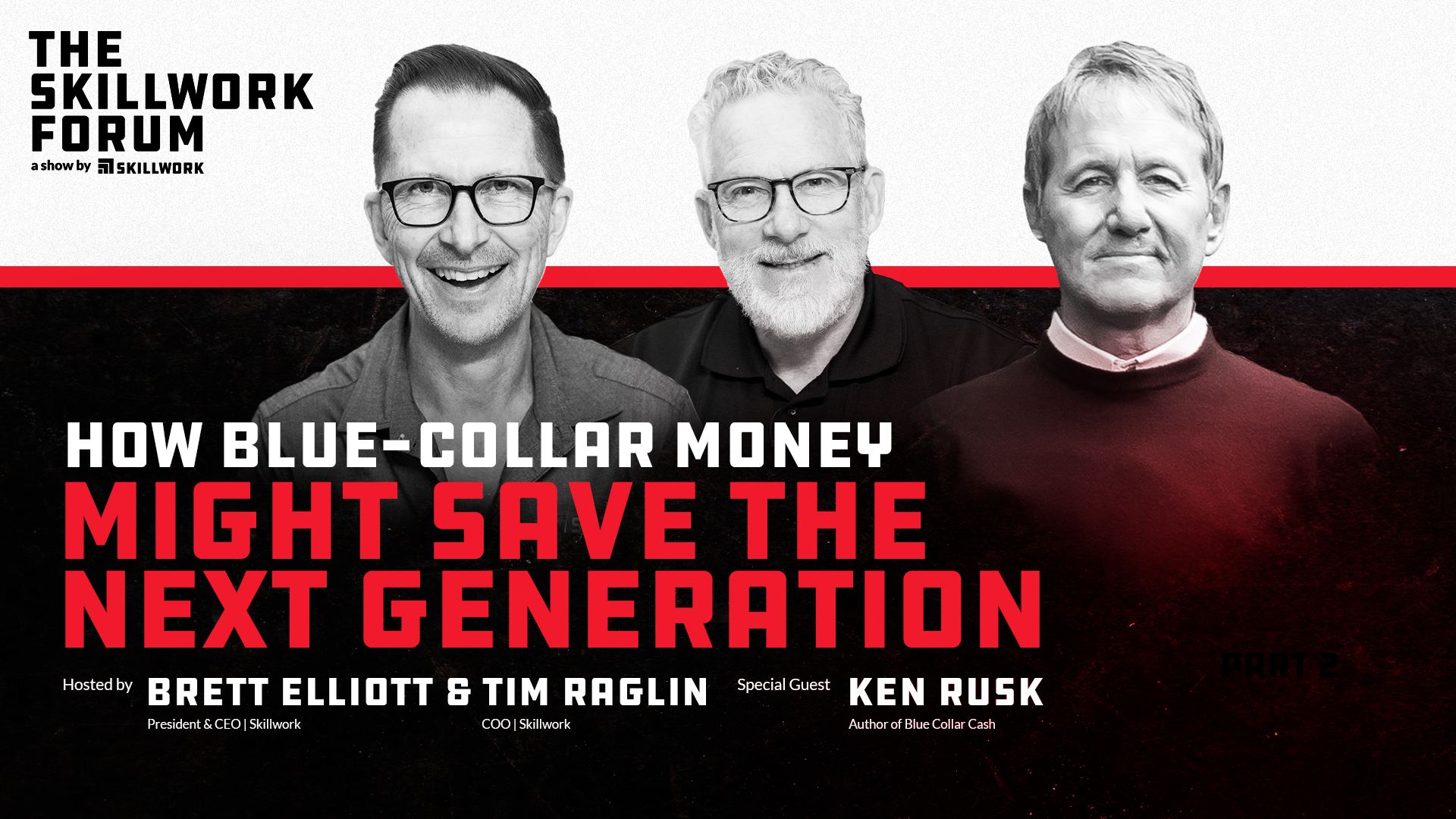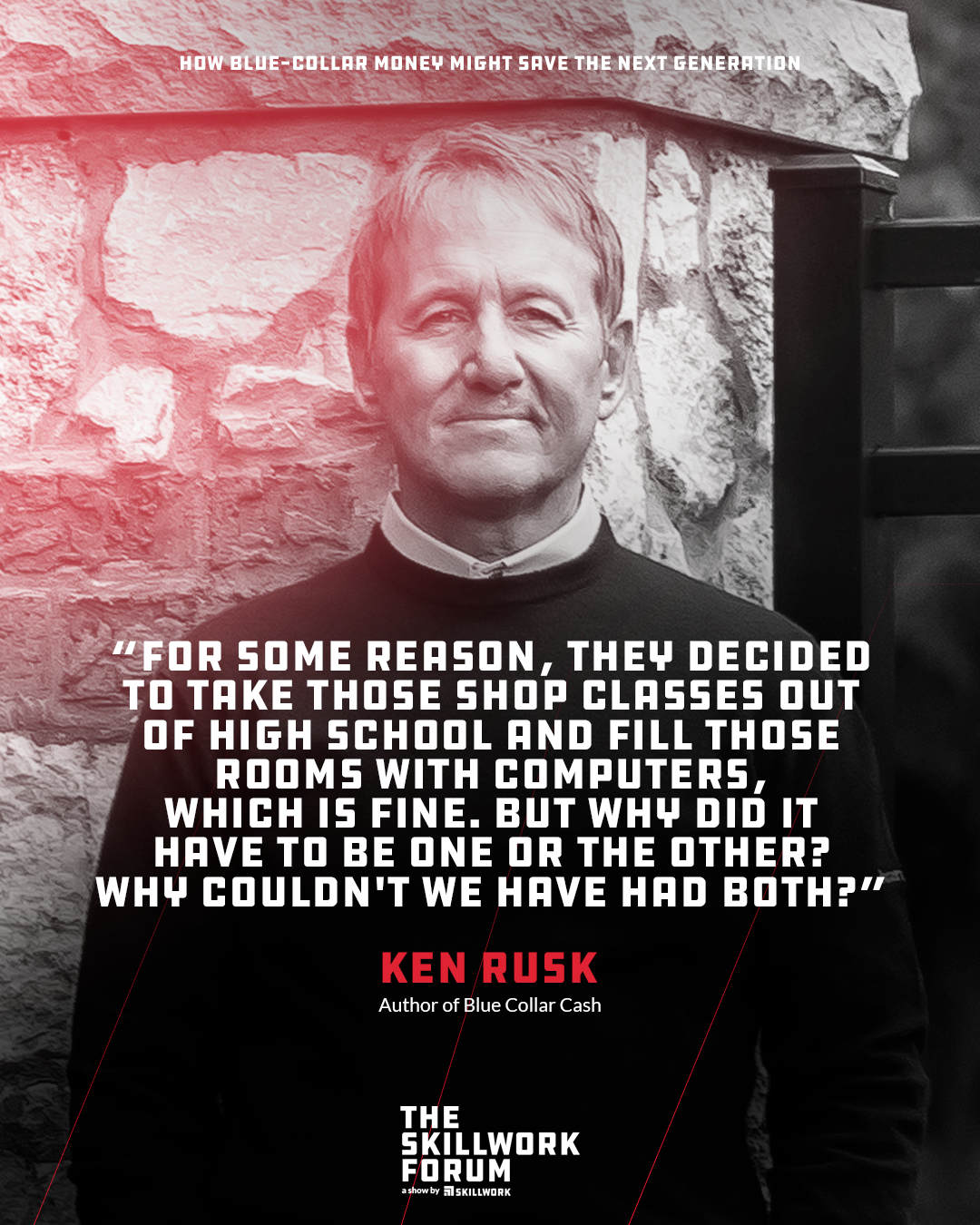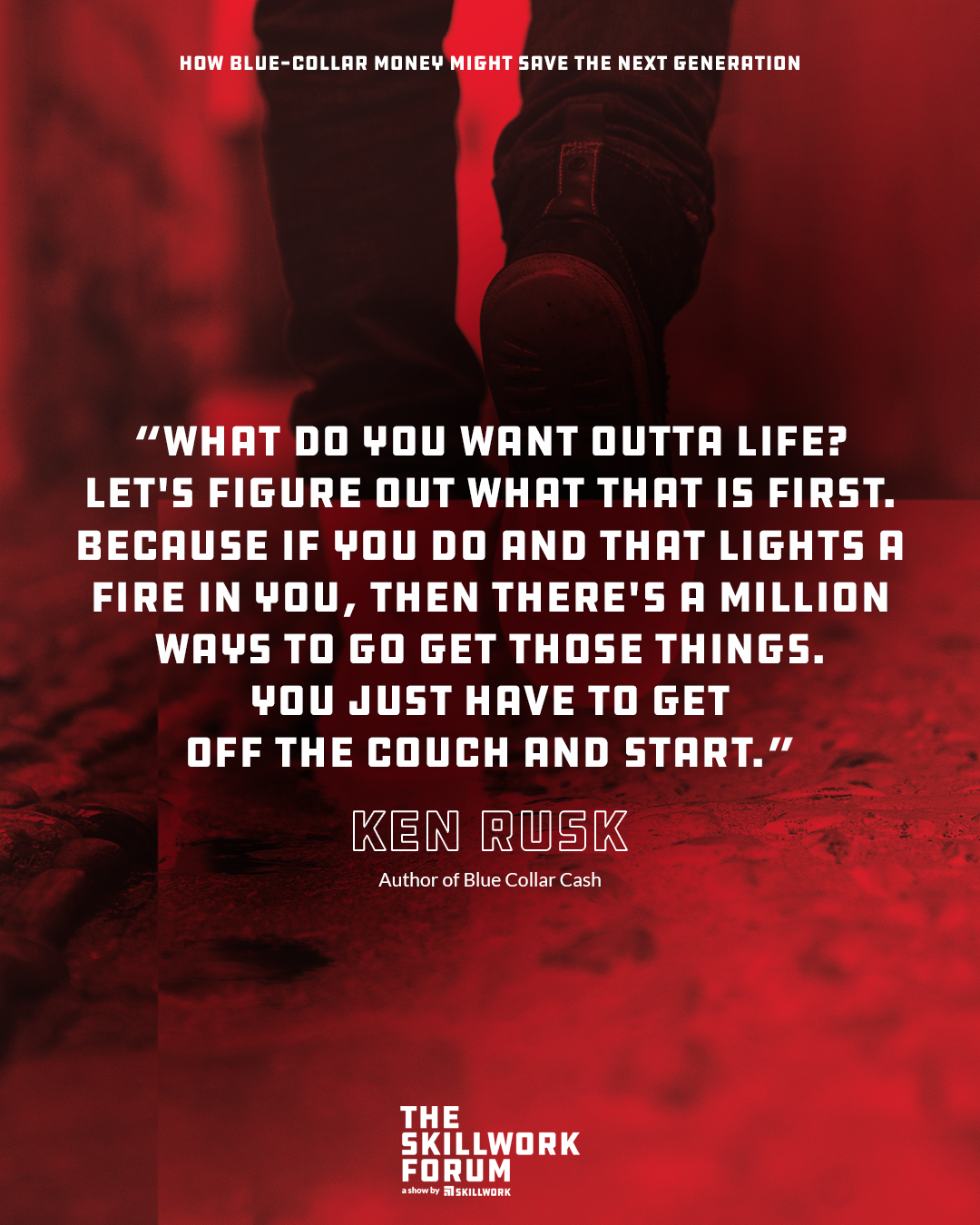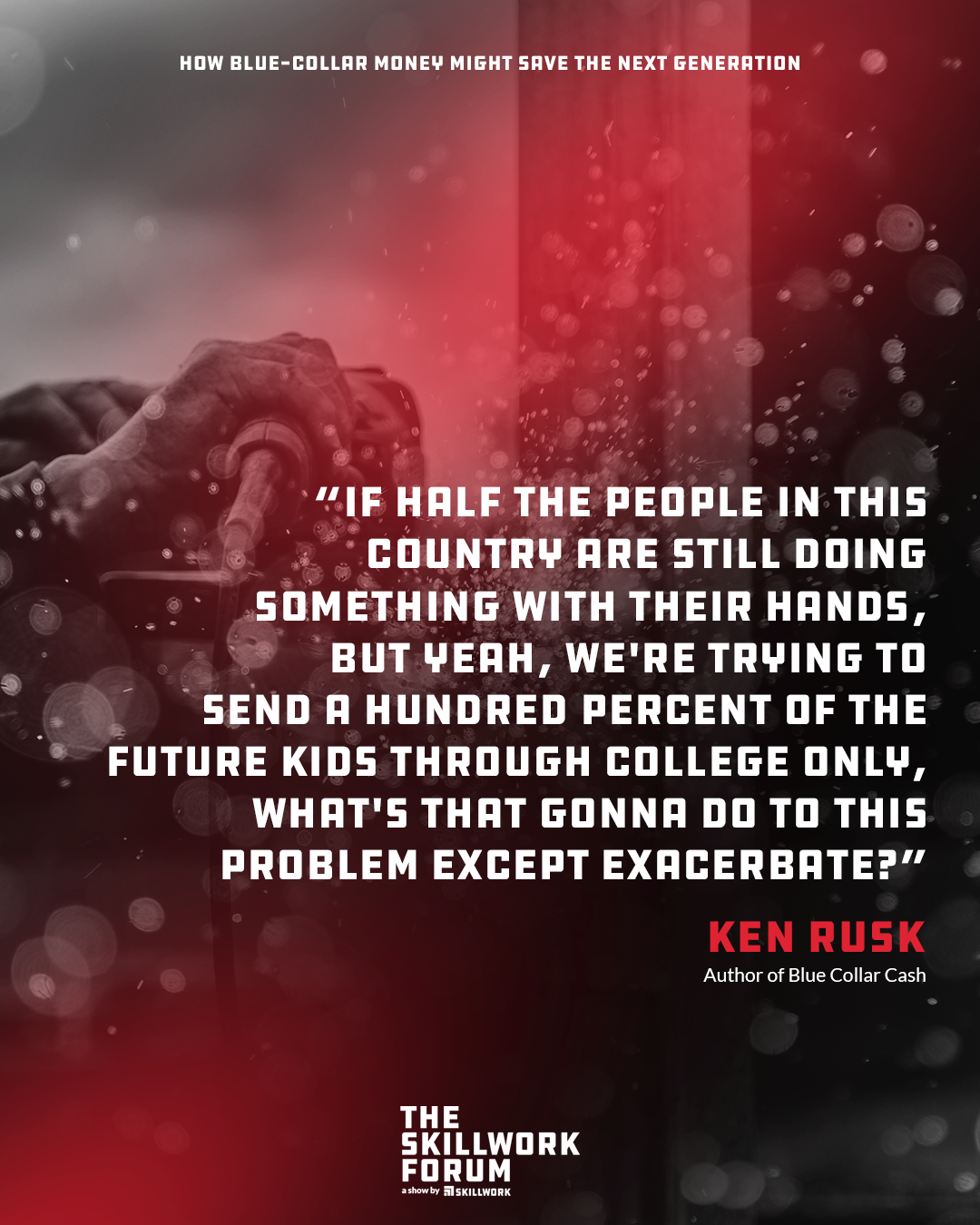The Blue-Collar Career Crisis With Ken Rusk

If you desire you can listen this episode on Spotify.
Today, we're excited and honored to have a special guest, Ken Rusk, join us on this episode of The Skillwork Forum.
Ken started in the trades as a ditch digger at 15 and worked his way up with an entrepreneurial spirit – the spirit that built America – to become a business owner, mentor, and life coach. He's got a passion for helping blue-collar workers come up through the ranks, so to speak, and apply their God-given gifts and talents to land blue-collar jobs that pay well.
In his book, "Blue Collar Cash: Love Your Work, Secure Your Future, and Find Happiness for Your Life," Ken shares his insights from over 30 years of working in blue-collar trades, which we’ll be learning more about in this episode.
About Ken Rusk & Blue Collar Cash
My high school shared a fence with an industrial park, and after school, we would cut through a well-worn hole in the fence to that industrial park. I just remember going through this industrial park, and there were a lot of things there that young guys liked: equipment, dump trucks, backhoes, etc.
I went to the one company and said, “What do you do here?” And they said, “Well, we basically dig ditches and fix old, wet, smelly basements.” I thought I was qualified for that, so I took an entry-level blue-collar job there, which started my blue-collar career. Three or four years later, it came time to decide whether to attend college or enter the workforce.
The company I worked for at the time came to me saying they were going to open up franchises around the Midwest and asked if I’d like to help. So I lived out of a suitcase traveling to different cities and opening up these franchises for other owners and training them in how to get things going.
After another three or four years, I got tired of living out of a suitcase. I settled in Toledo, Ohio, and started up my own company that’s grown from six people to almost 200.
The Blue-Collar Career Crisis
At age 15, Ken wasn’t afraid of hard work. However, there’s a crisis in the workforce right now that’s been tagged as a “war on work,” where hard work is seen as a four-letter word. And it’s been caused by a series of unfortunate events.
- High schools stopped offering shop classes. Those rooms are now filled with computers, which is fine—but why did it have to be one or the other? By doing so, they eliminated the opportunity for millions of kids to discover how cool it is to work on cars, build a barn, style someone’s hair, etc.
- Electronics have become a primary pastime. Kids don’t play the same way today that they did in the past. Building a city on Minecraft using your cell phone, while it may be fun, is not the same experience as working with your hands to build a real-life tree fort.
- Colleges have taught us to rely on them. Colleges have made parents, in particular, feel like they need to rely on them if they want their kids to be successful. This has created a stigma against anyone who goes against the grain and pursues a blue-collar job vs. a white-collar one that a counselor recommends.
Parents need to ask themselves: Is the endgame a highly educated child or a happy, independent, financially sound child? And we need to be asking kids, not where are you going to college, but why are you going to college?
There’s $1.7 trillion in school debt, yet only 35% of college graduates use the degree they earned. It’s a wholly inefficient system that’s being pushed onto kids these days.
Let's assume it’s $50,000 a year all-in for tuition, books, travel, room and board…the whole nine yards—that's $200,000 over a four-year period. We just saw a study where construction jobs are now reaching $30 an hour, which is $75,000/year. That's $300,000 over a four-year period of time, while the college kid is almost a quarter million dollars in debt.

The good news for tradesmen is, where supply is low, and demand is high, that's where the money goes. And that’s certainly what you're seeing now with the best blue-collar jobs paying skilled workers very competitive wages.
Next, we talk about setting goals that help you establish a vision for what you want in the future and then lay out a course to do it.

5 Steps to Achieving Any Goal
A goal is nothing more than just a path to gaining, to getting somewhere, to getting something.
- Congratulate yourself. First, you have to congratulate yourself that you're now somebody that most people aren't—selfish. Not selfish at the expense of others, but selfish focusing on you. So congratulate yourself that you're in a new place, almost like a smoker who said, “I’m done,” and quit.
- Set your goal. Pick something that you're going to go after. Whatever it is, you have to really want it. You have to picture it, colorize it, draw it, and make it clear, concise, and custom to you. Set the goal that you want to achieve.
- Create a path. Define the steps it takes to get where you want to go. For example, one of Ken’s goals was to travel to Europe to play golf in Scotland. His path to get there was setting aside $30/week for three years until he saved enough money to go.
- Set it in motion. You can’t hope to get somewhere; you have to commit to doing the work to get there. Start setting aside that $30 of your paycheck or whatever your path to reach your goal looks like. Don’t think about it—do it.
- Share your goal. Keep yourself accountable with friends or mentors. Having a buddy is always important. For example, you're going to workout a lot more often if somebody’s waiting for you at the gym.
And it's not like you have a single goal for your whole life. You have many milestones along the way that you're trying to achieve, so break things up into achievable goals this way.

If you’re interested in learning more, Ken developed a course called The Path for people to take the book and implement it today. It's eight sessions that are 45 minutes a piece. It gets you thinking a little bit about what your future could look like. The course is $129. Plus, you get a free copy of Ken Rusk’s “Blue Collar Cash” book ($25 value). And if you decide to do it, you can also donate one to a friend, loved one, or whoever.
We strongly encourage you to take a look at that course and follow Ken on social @kenruskofficial. Thanks for joining us for another episode of The Skillwork Forum. God bless!

